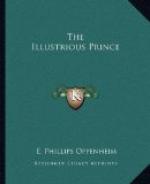“I am extremely obliged to you,” he said. “I am sure I should find it most interesting. Another time I should be very glad indeed to look through those specifications, but just now I have this affair of my own rather on my mind. About this Mr. Richard Vanderpole, Mr. Coulson, then,” he added. “Do I understand that this young man came to you as a complete stranger?”
“Absolutely,” Mr. Coulson answered. “I never saw him before in my life. As decent a young chap as ever I met with, all the same,” he went on, “and comes of a good American stock, too. They tell me there’s going to be an inquest and that I shall be summoned, but I know nothing more than what I’ve told you. If I did, you’d be welcome to it.”
Mr. Jacks leaned back in his chair. Certainly the situation increased in perplexity! The man by his side was talking now of the adaptation of one of his patents to some existing machinery, and Jacks watched him covertly. He considered himself, to some extent, a physiognomist. He told himself it was not possible that this man was playing a part. Mr. James B. Coulson sat there, the absolute incarnation of the genial man of affairs, interested in his business, interested in the great subject of dollar-getting, content with himself and his position,—a person apparently of little imagination, for the shock of this matter concerning which they had been talking had already passed away. He was doing his best to explain with a pencil on the back of an illustrated paper some new system of wool-bleaching.
“Mr. Coulson,” the Inspector said suddenly, “do you know a young lady named Miss Penelope Morse?”
It was here, perhaps, that Mr. Coulson sank a little from the heights of complete success. He repeated the name, and obviously took time to think before he answered.
“Miss Penelope Morse,” the Inspector continued. “She is a young American lady, who lives with an invalid aunt in Park Lane, and who is taken everywhere by the Duchess of Devenham, another aunt, I believe.”
“I suppose I may say that I am acquainted with her,” Mr. Coulson admitted. “She came here the other evening with a young man—Sir Charles Somerfield.”
“Ah!” the Inspector murmured.
“She’d read that interview of mine with the Comet man,” Mr. Coulson said, “and she fancied that perhaps I could tell her something about Hamilton Fynes.”
“First time you’d met her, I suppose?” the Inspector remarked.
“Sure!” Mr. Coulson answered. “As a matter of fact, I know very few of my compatriots over here. I am an American citizen myself, and I haven’t too much sympathy with any one, man or woman, who doesn’t find America good enough for them to live in.”
The Inspector nodded.
“Quite so,” he agreed. “So you hadn’t anything to tell this young lady?”
“Not a thing that she hadn’t read in the Comet,” Mr. Coulson replied. “What brought her into your mind, anyway?”




